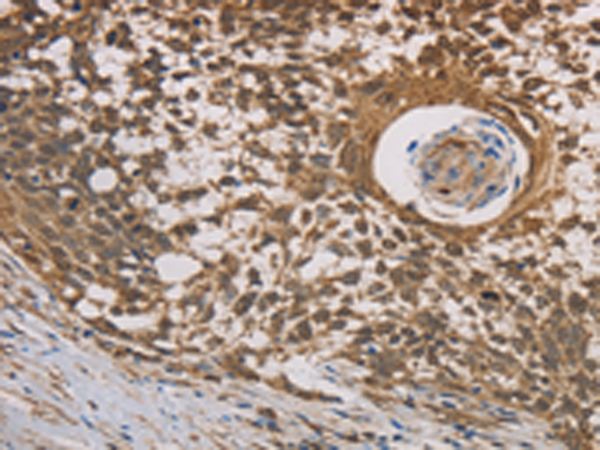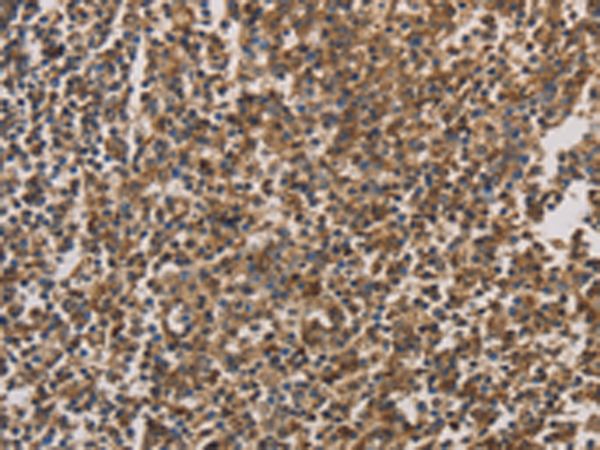

| WB | 咨询技术 | Human,Mouse,Rat |
| IF | 咨询技术 | Human,Mouse,Rat |
| IHC | 1/50-1/200 | Human,Mouse,Rat |
| ICC | 技术咨询 | Human,Mouse,Rat |
| FCM | 咨询技术 | Human,Mouse,Rat |
| Elisa | 1/2000-1/5000 | Human,Mouse,Rat |
| Aliases | HSTF1 |
| Host/Isotype | Rabbit IgG |
| Antibody Type | Primary antibody |
| Storage | Store at 4°C short term. Aliquot and store at -20°C long term. Avoid freeze/thaw cycles. |
| Species Reactivity | Human, Mouse |
| Immunogen | Fusion protein of human HSF1 |
| Formulation | Purified antibody in PBS with 0.05% sodium azide and 50% glycerol. |
+ +
以下是关于HSF1抗体的3篇参考文献及其摘要概括:
---
1. **文献名称**:*HSF1: Guardian of Proteostasis in Cancer*
**作者**:Dai, C., et al.
**摘要内容**:该研究通过Western blot和免疫组化实验(使用HSF1抗体)揭示了HSF1在多种癌症中异常激活的现象,并证明其通过调控热休克蛋白(HSPs)促进肿瘤细胞存活和耐药性,为靶向HSF1的癌症治疗提供了依据。
---
2. **文献名称**:*A Systems Biology Approach to Dissecting the Role of HSF1 in Proteotoxic Stress Response*
**作者**:Santagata, S., et al.
**摘要内容**:作者利用HSF1抗体进行染色质免疫沉淀(ChIP)和免疫荧光实验,发现HSF1在细胞应激时动态结合DNA并激活特定靶基因,揭示了其在维持蛋白稳态中的时空调控机制。
---
3. **文献名称**:*HSF1 Antibody-Based Detection of Stress Granule Dynamics in Aging*
**作者**:Neef, D.W., et al.
**摘要内容**:研究通过HSF1抗体检测衰老模型中HSF1的亚细胞定位变化,发现其核转位能力随年龄增长下降,导致应激反应减弱,提示HSF1功能衰退与衰老相关蛋白聚集疾病(如阿尔茨海默病)的关联。
---
这些文献均通过HSF1抗体在分子或细胞水平探究其功能,涵盖癌症、应激响应及衰老领域。如需扩展可补充具体期刊与年份。
The Heat Shock Factor 1 (HSF1) antibody is a critical tool for studying the cellular stress response and protein homeostasis. HSF1. a transcription factor, is the master regulator of the heat shock response (HSR), a conserved mechanism that protects cells from proteotoxic stress (e.g., heat, toxins, hypoxia). Under stress, HSF1 trimerizes, translocates to the nucleus, and binds heat shock elements (HSEs) in DNA, activating the expression of heat shock proteins (HSPs) like HSP70 and HSP90. These chaperones assist in protein folding, prevent aggregation, and promote cell survival.
HSF1 antibodies are widely used in research to detect HSF1 expression, localization, and post-translational modifications (e.g., phosphorylation) via techniques like Western blot, immunofluorescence, and ChIP. They help elucidate HSF1's roles beyond stress responses, including its involvement in cancer (promoting tumorigenesis and metastasis), neurodegenerative diseases (e.g., Alzheimer’s), and aging. Notably, HSF1 activation is context-dependent; while it supports cell survival under acute stress, chronic activation in cancer may drive malignancy.
Researchers also use HSF1 antibodies to study inhibitors targeting its oncogenic activity or activators to enhance cytoprotection in degenerative conditions. Specific antibodies distinguishing between HSF1 isoforms or activation states (e.g., phosphorylated HSF1 at Ser303/307) are vital for precise mechanistic insights. Overall, HSF1 antibodies are indispensable for exploring stress adaptation pathways and therapeutic strategies in proteostasis-related diseases.
×